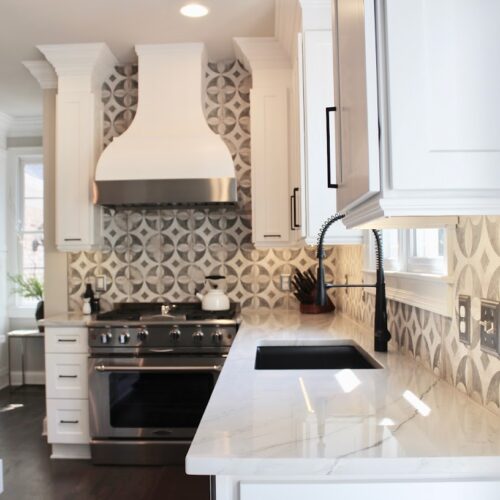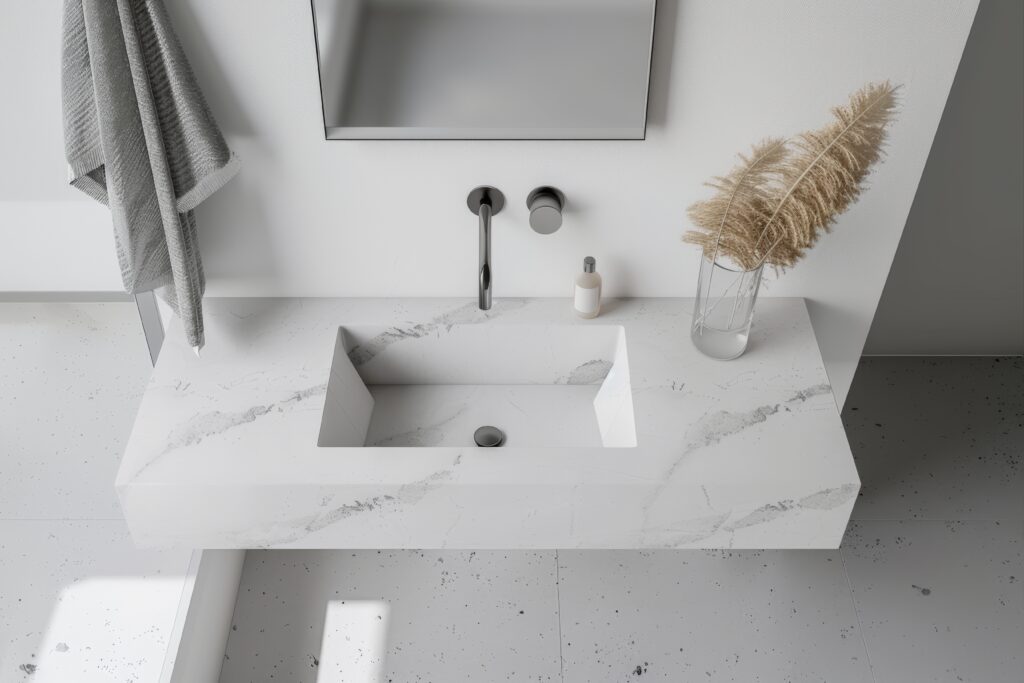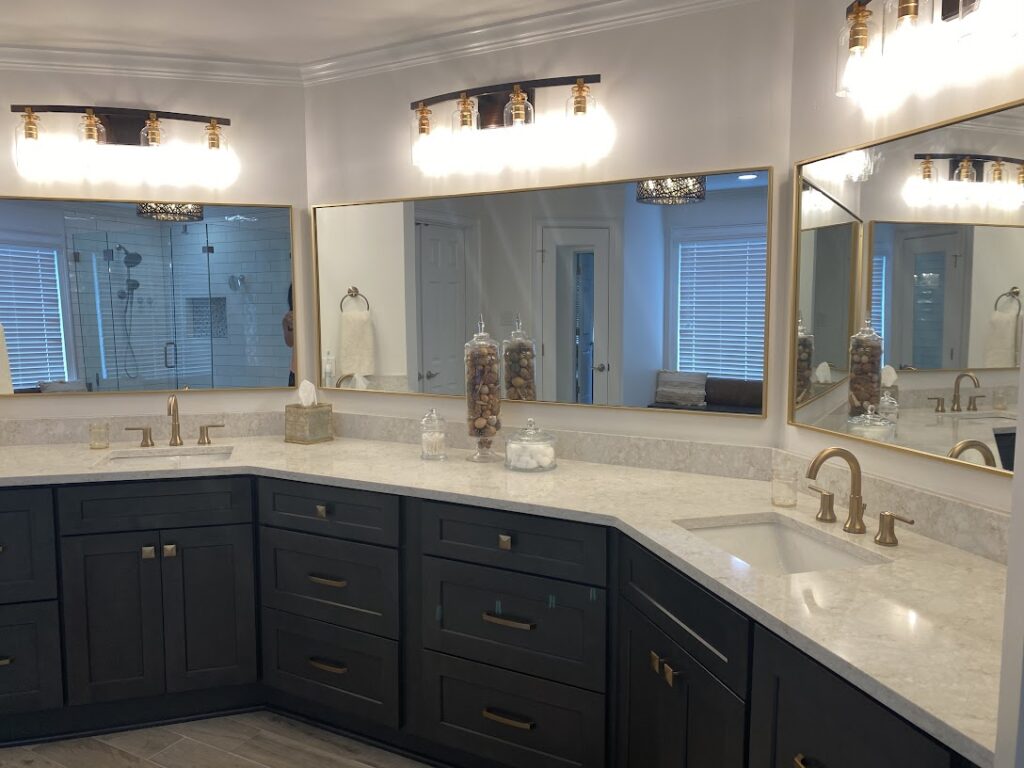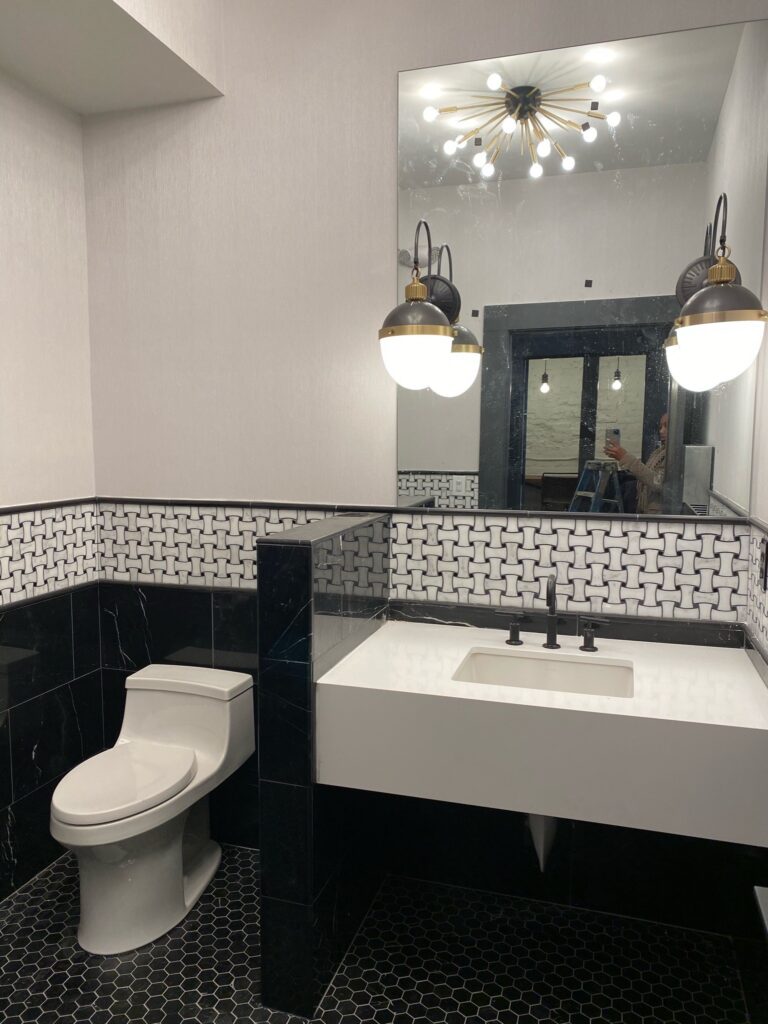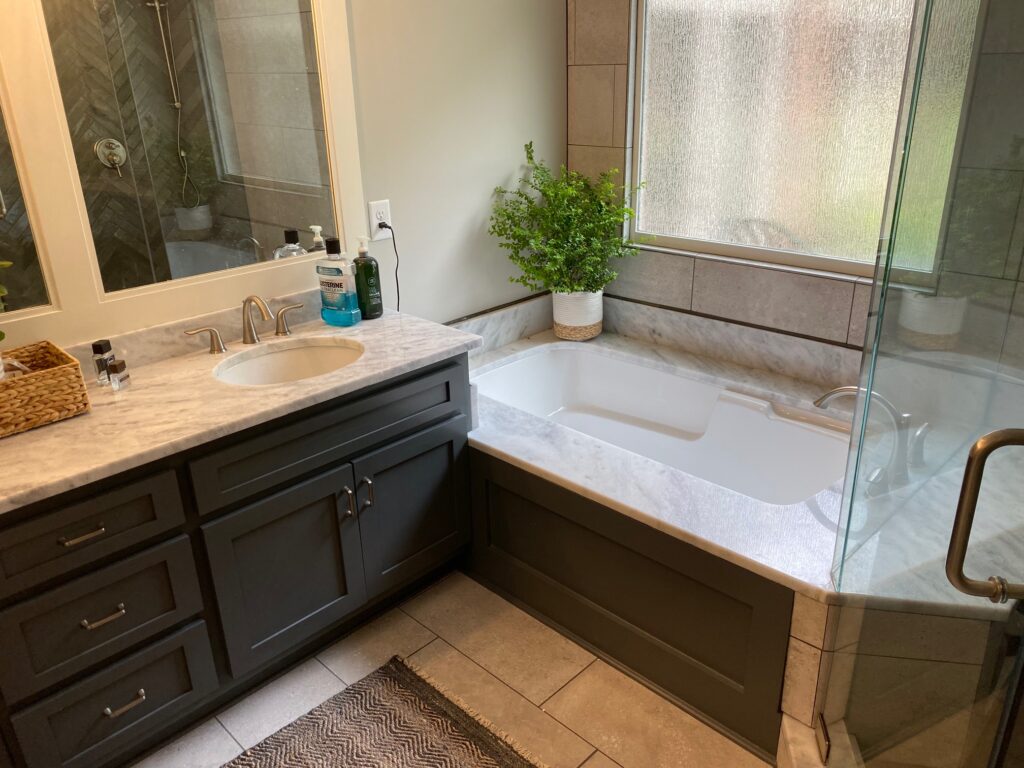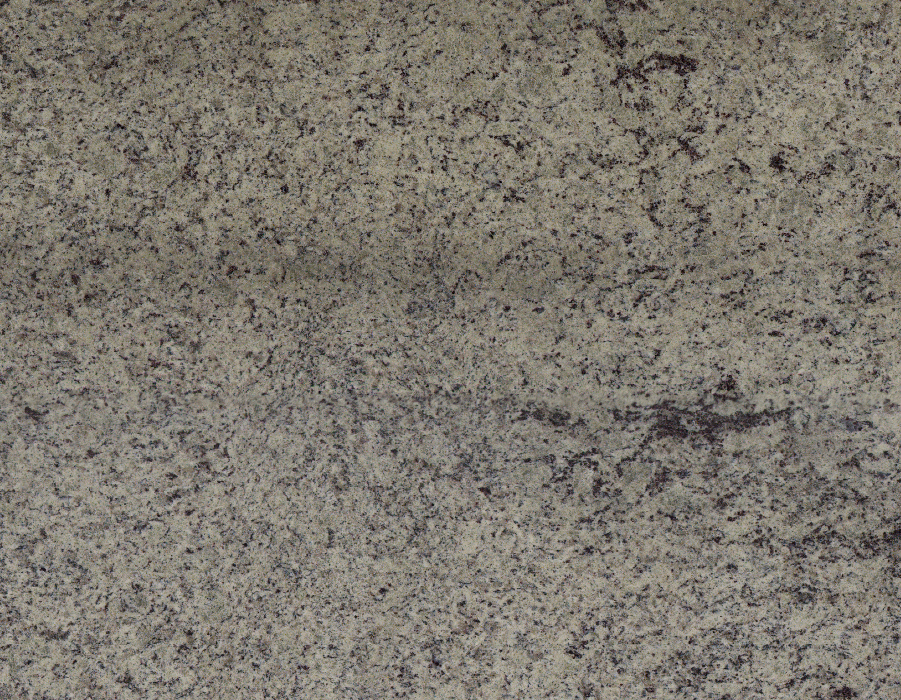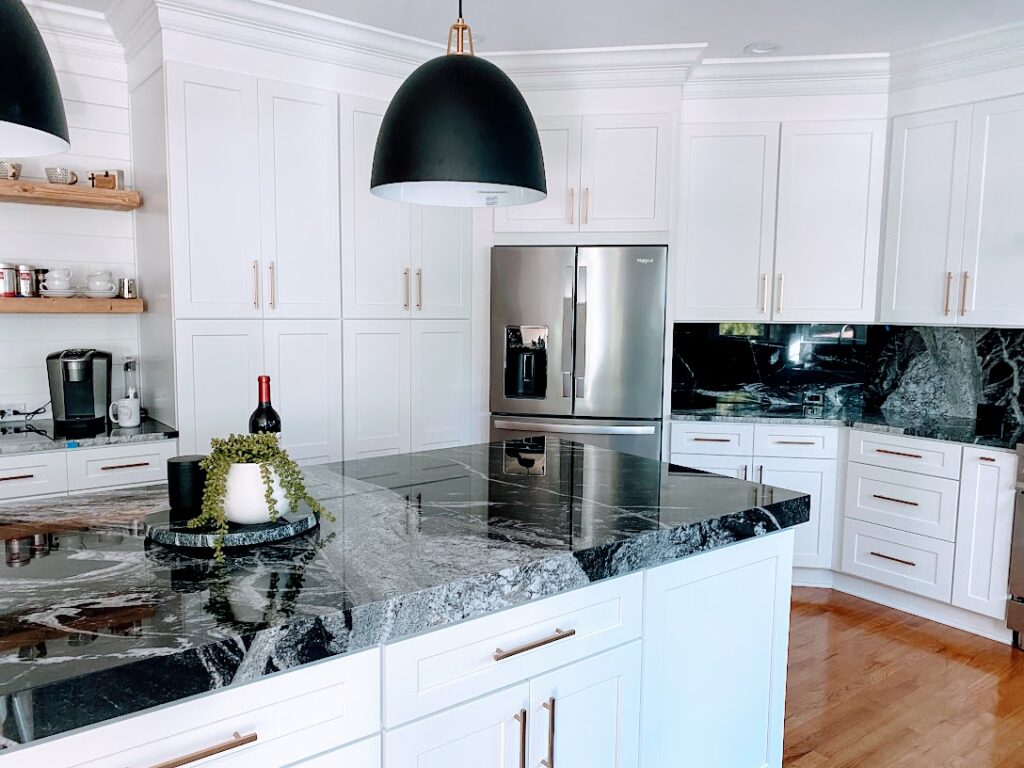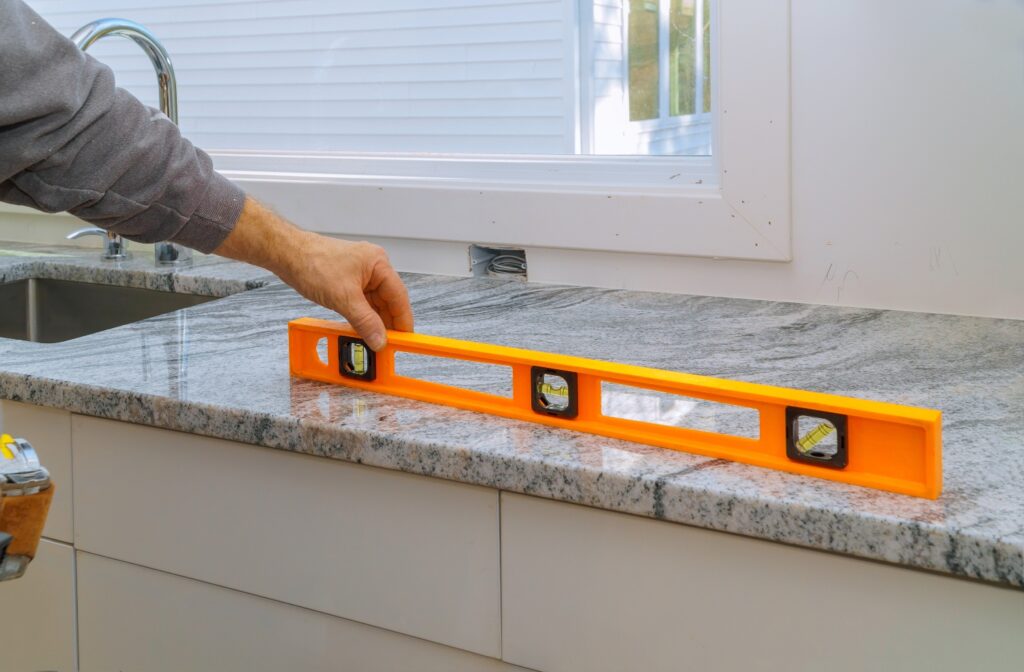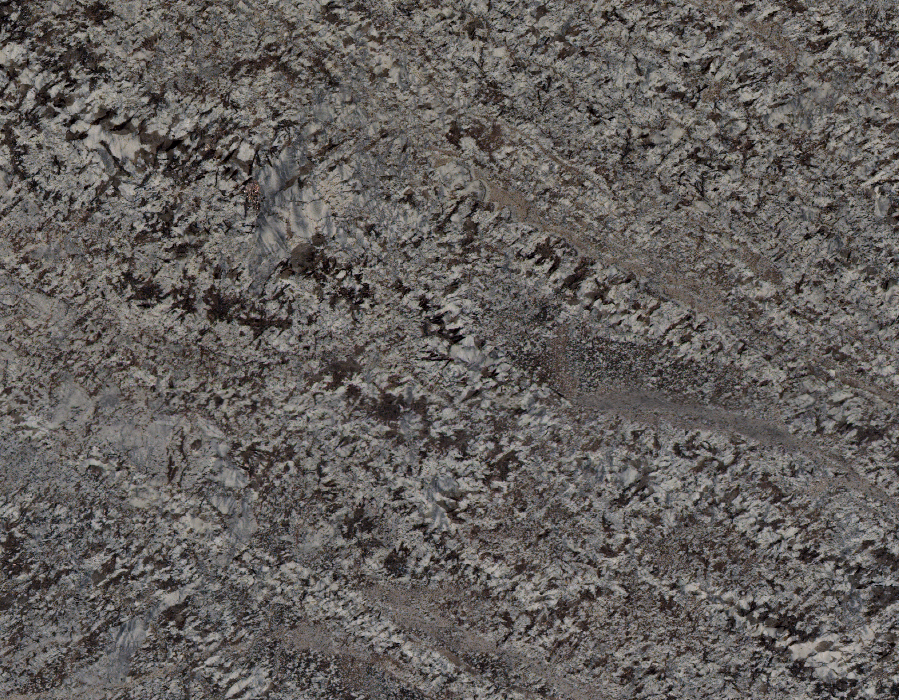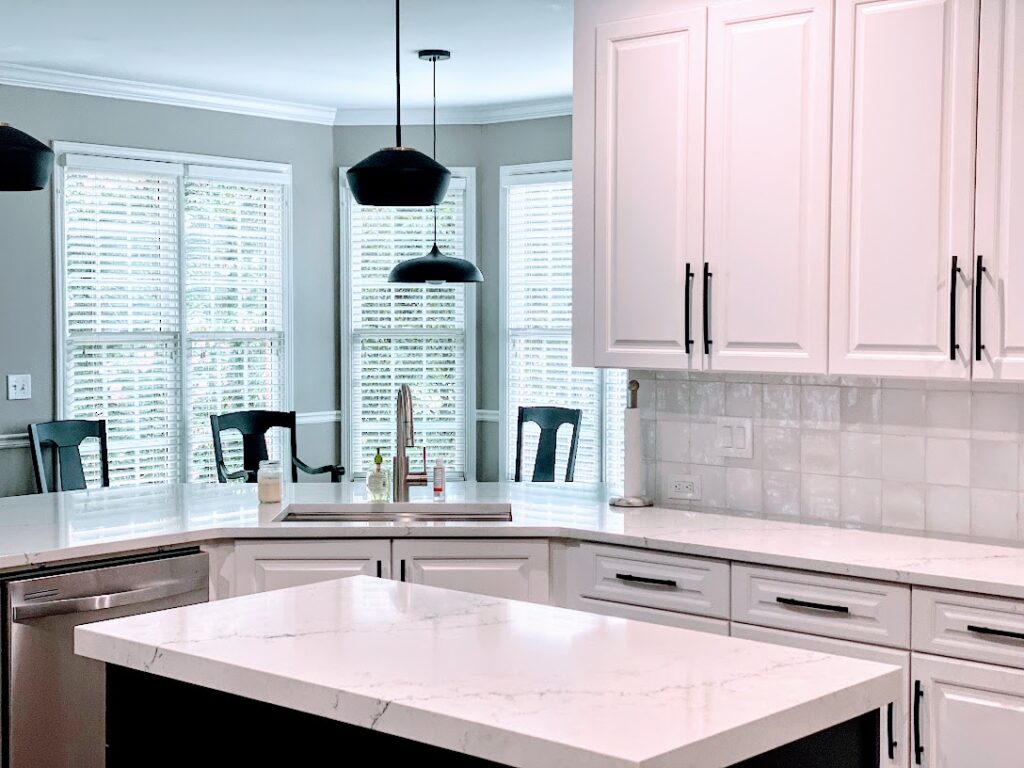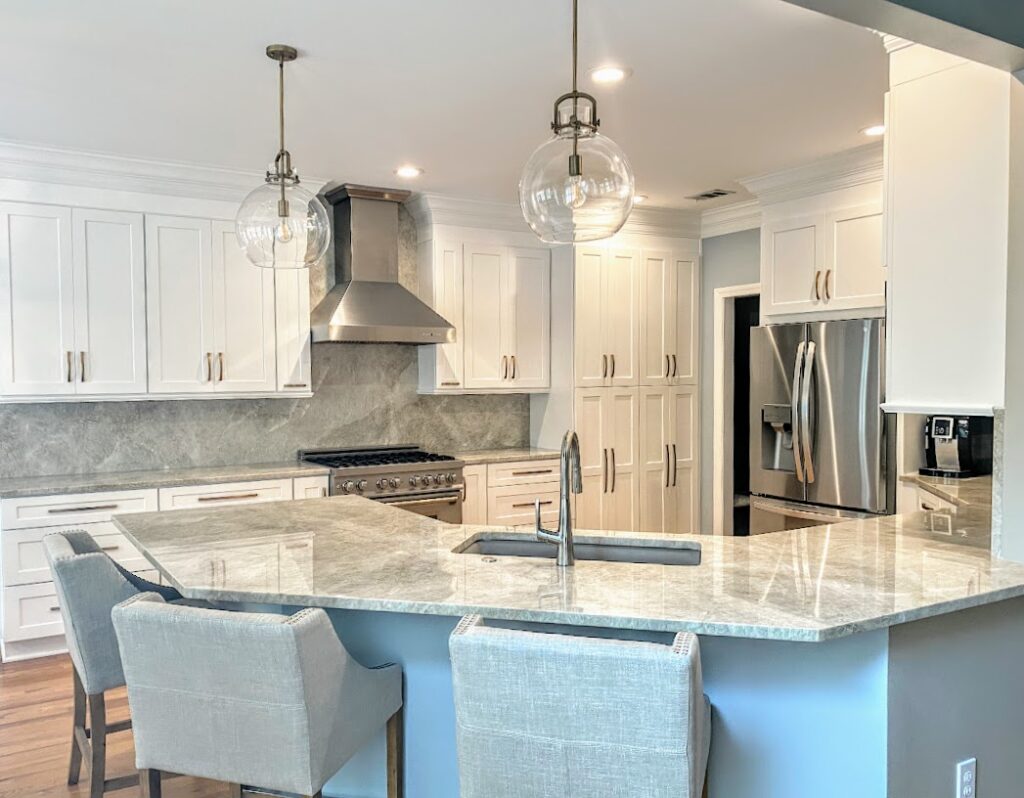Quartz Countertops vs. Laminate Countertops
When you’re choosing between quartz and laminate countertops, you’re really deciding on more than just the surface on which you’ll prepare meals. Quartz offers a sleek, durable option with its non-porous nature, resisting scratches and stains, while laminate provides an affordable, versatile choice with countless design possibilities. But have you considered how each impacts maintenance, installation, and even the environment? These factors might sway your decision more than you think. So, how do you balance style, budget, and sustainability in your kitchen remodel? The answer may surprise you as we explore deeper.
Material Composition
Understanding the material composition of countertops is crucial. You have a choice between quartz and laminate, each offering distinct characteristics.
Quartz countertops are engineered from natural quartz crystals, resin binders, and pigments. This results in a durable, non-porous surface that resists scratches and stains. Quartz’s structure ensures it’s less likely to harbor bacteria, making it a hygienic choice for kitchens and bathrooms. It’s essentially a blend of about 90-95% crushed quartz and 5-10% polymers and resins, giving it both strength and a wide variety of color options.
On the other hand, laminate countertops consist of a core material, typically particleboard or medium-density fiberboard (MDF), topped with a decorative layer. This top layer is made from paper treated with resins to enhance durability and is then sealed with a clear protective coating.
While not as robust as quartz, laminate is lightweight and easier to install, often appealing for budget-conscious projects. Its composition allows for a broad range of patterns and colors, though it’s more prone to scratching and heat damage.
In making your decision, consider how each material will perform in your space. Quartz offers more resilience and longevity, ideal for high-traffic areas requiring durability.
Laminate, while less durable, provides a cost-effective solution that’s easier to replace if your style or needs change over time. By understanding these core differences, you’re better equipped to choose the material that aligns with your functional needs and lifestyle.
Aesthetic Appeal
While understanding the material composition of countertops helps assess their durability and functionality, their aesthetic appeal plays an equally significant role in your decision-making process. When you’re deciding between quartz and laminate countertops, consider how each can transform your kitchen or room into a visually appealing space.
Quartz countertops offer a sophisticated, high-end look. They’re available in a wide range of colors and patterns, including some that mimic the appearance of natural stone like marble and granite. Quartz’s rich, consistent patterns add a touch of luxury to any room.
If you aim for a seamless, elegant design, quartz delivers with its smooth and polished finish. It’s perfect for creating a modern, sleek aesthetic that matches well with contemporary decor.
On the other hand, laminate countertops provide versatility with a vast array of designs, colors, and textures. They’ve come a long way from the basic patterns of the past, now offering impressive imitations of wood, stone, and other materials.
Laminate can be an excellent choice if you want to experiment with bold colors or unique patterns without the high cost. It’s a great option for those who enjoy frequently updating their home’s look or for projects on a tighter budget.
The choice between quartz and laminate ultimately depends on your style preferences and how you envision the overall look of your space. Both options allow you to express your taste, whether you prefer quartz’s upscale elegance or laminate’s adaptable charm.
Durability and Maintenance
Durability is a key factor when choosing between quartz and laminate countertops. When you’re thinking about how long your investment will last, quartz stands out. It’s engineered from natural quartz stone mixed with resins, making it incredibly hard and resistant to scratches, dents, and chips. Quartz countertops can handle the wear and tear of daily use without losing their polished look.
On the other hand, laminate countertops, while affordable, don’t offer the same level of durability. They’re made of layers of paper and resin bonded onto particleboard, making them more susceptible to scratches, dings, and even burns from hot pots. If you’re not careful, sharp knives or heavy kitchen equipment can easily damage the surface. However, you can extend their lifespan considerably with cautious use and protective measures.
Maintenance-wise, quartz countertops are a breeze. They’re non-porous, so they don’t absorb liquids, making them resistant to stains and bacteria. You’ll only need a mild soap and water solution to keep them clean. There’s no need for sealing, which cuts down on upkeep time.
While laminate countertops require a bit more attention, they are still relatively easy to maintain. They need regular wiping to prevent stains, especially from acidic substances like wine or coffee. Though they don’t need sealing either, it’s crucial to quickly clean up spills and avoid harsh cleaners that might damage the surface.
Ultimately, choosing between quartz and laminate depends on your priorities for durability and maintenance.
Cost Comparison
Choosing between quartz and laminate countertops often comes down to your budget. If you’re watching your wallet closely, laminate countertops might seem like the obvious choice. Their affordability makes them attractive options if you’re aiming for a quick, cost-effective kitchen or bathroom upgrade.
On the other hand, quartz countertops, known for their luxurious appeal and durability, come with a heftier price tag. This significant investment reflects quartz’s quality and longevity, which can be worth it if you’re looking to increase your home’s value or want a countertop that’ll stand the test of time.
When considering cost, you should also think about the long-term implications. While laminate countertops are initially cheaper, they may require more frequent replacements or repairs over the years due to wear and tear. In contrast, although more expensive upfront, quartz countertops could save you money in the long run with their durability and low maintenance needs.
Budgeting for countertops involves more than just the initial purchase. Consider the lifespan and potential resale value of your investment. Quartz may offer a better return on investment if you plan to sell your home.
Ultimately, your decision should be based on your financial situation, style preferences, and how you envision using your countertop day to day. Balancing these factors will help you choose the best option for your home.
Installation Process
The process of installing countertops can vary significantly between quartz and laminate. If you’re opting for quartz, prepare for a more involved installation. Quartz countertops are heavy and require professional handling to be placed correctly.
The installers will precisely measure your space, often using templates to cut the quartz to specifications. They’ll also need to prepare the underlying cabinets to support the weight. Seams must be carefully aligned and sealed during installation, adding to the complexity and time involved.
On the other hand, installing laminate countertops is usually simpler and quicker. You might even consider doing it yourself if you have some DIY skills. Laminate is lightweight, making it easier to maneuver and fit into your kitchen or bathroom.
The material comes in large sheets or prefabricated pieces that can be cut to size with basic tools. Installation involves securing the laminate to a substrate, usually using adhesive. The edges are then finished with matching strips, and seams are sealed to protect against moisture.
Both types of countertops require a level surface to ensure a proper fit, but quartz demands more structural support due to its weight. Laminate’s flexibility makes it more forgiving in slightly uneven spaces.
Ultimately, laminate could be the way to go if you want a faster, more budget-friendly option. However, quartz is an excellent choice if you desire a long-lasting, high-end look and are willing to invest in professional installation.
Environmental Impact
While considering the installation process, it’s also important to evaluate the environmental impact of your countertop choice. If you’re leaning towards quartz countertops, you should know that quartz is a natural stone bound with resins. The mining and fabrication can be energy-intensive and contribute significantly to carbon emissions.
However, many manufacturers have adopted eco-friendly practices, such as recycling water during production and using renewable energy sources. Additionally, quartz’s durability means it won’t need frequent replacements, reducing waste over time.
On the other hand, laminate countertops are constructed from layers of particleboard and a plastic surface, which usually involves using formaldehyde and other chemicals. The production process for laminate is less energy-intensive than that of quartz, making it a more environmentally benign option for initial manufacturing.
However, laminate is less durable and more prone to damage, which can lead to more frequent replacements. These replacements can increase the overall environmental footprint of laminate over its lifespan.
When you weigh the environmental impact, consider what matters most to you. If you’re focused on long-term sustainability and can afford a higher upfront investment, quartz might be your best bet.
However, if minimizing initial resource use and chemical exposure is your priority, laminate could be more appealing. Choosing quartz and laminate countertops should reflect your style, budget, and environmental values.
Frequently Asked Questions
How Do Quartz and Laminate Countertops Affect Home Resale Value?
When considering resale value, you should know that high-quality materials often boost a home’s appeal. Buyers typically favor durable options, so investing in upscale countertops can enhance your property’s attractiveness and market value.
Are Quartz or Laminate Countertops Better for Allergy Sufferers?
You’re focused on reducing allergens at home. Choose materials that don’t harbor dust or mold. Quartz is non-porous and easy to clean, making it a better option for allergy sufferers than porous alternatives.
Can Quartz or Laminate Countertops Be Customized to Fit Unusual Kitchen Layouts?
You can customize countertops to fit unique kitchen layouts. With precise measurements, both materials allow for tailored cuts and designs. Consider your specific needs and preferences to ensure your countertops enhance your kitchen’s functionality and aesthetic appeal.
Which Countertop Type Offers More Color and Pattern Variety?
When considering color and pattern variety, laminate countertops offer a broader selection. They mimic various materials, giving you more flexibility. Quartz also offers variety, but laminate’s extensive options allow you to match any kitchen style.
How Do Quartz and Laminate Countertops Perform With Heat Exposure?
When exposed to heat, laminate countertops are likely to warp or scorch. Quartz countertops, however, handle heat better but can still be damaged by extreme temperatures. Always use trivets or pads to protect them.
Conclusion
Consider your priorities when choosing between quartz and laminate countertops. Quartz offers unmatched durability and a sleek, high-end look, making it an eco-friendly choice for long-term investment. While it comes at a higher cost, its low maintenance and resistance to damage justify the price. On the other hand, if budget and variety are your main concerns, laminate provides a cost-effective solution with diverse designs, though it demands more upkeep. Ultimately, your choice depends on balancing these factors.

Val Carvalho is a manager at Atlanta Stone Creations, with nearly two decades of experience in the stone and design industry. In addition to her leadership role, Val plays a key part in sales and design, bringing creativity, precision, and a strong sense of style to every project. Known for her warm and collaborative approach, she builds strong relationships with both her team and her clients. Val is passionate about delivering beautiful, high-quality results and creating an exceptional experience from start to finish.

